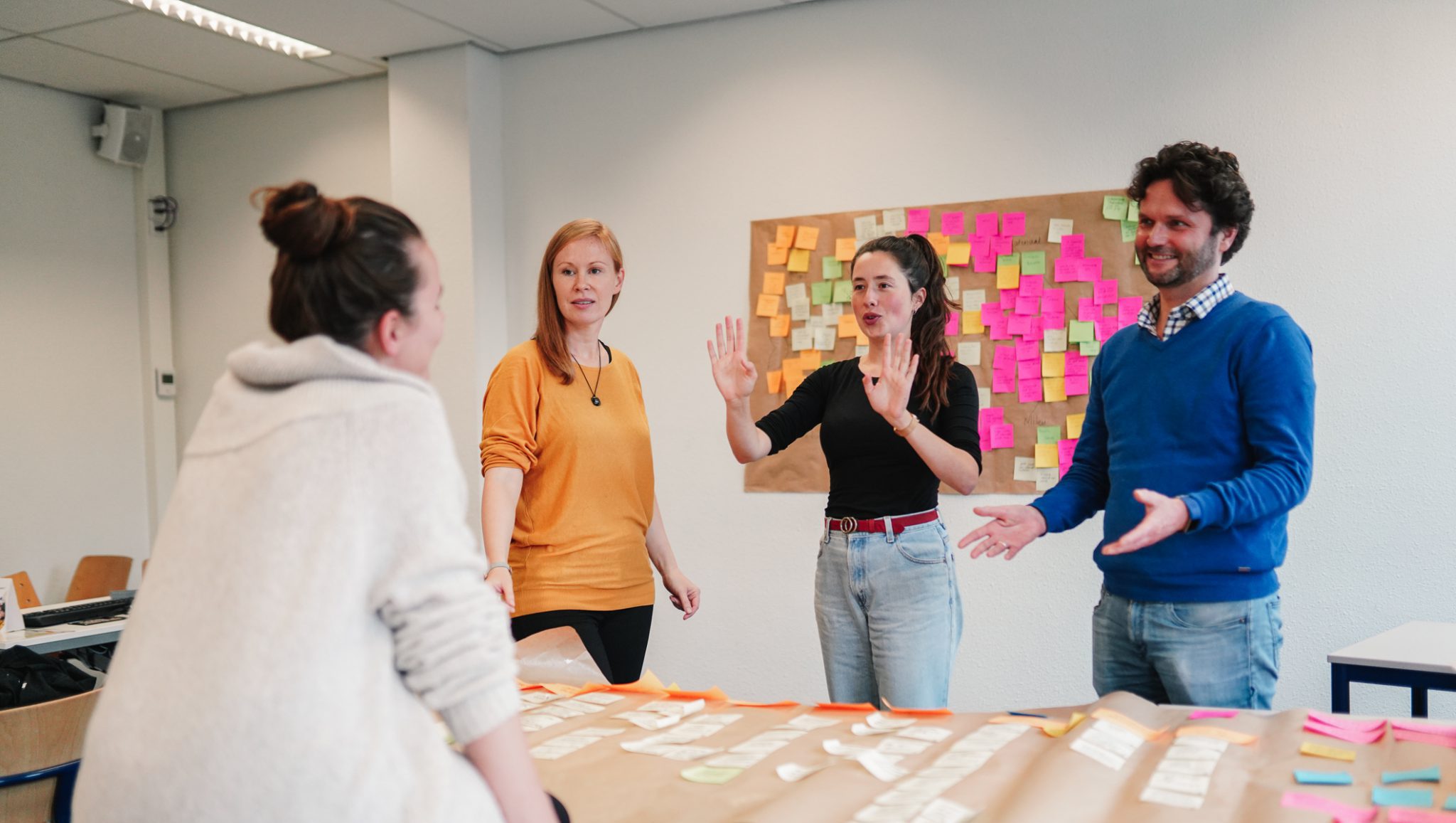
University Teaching Qualification (UTQ/ BKO) | EB and FMG
Develop your teaching style, learn how to teach in an activating way and how to design a subject. With the BKO programme you build a foundation for further development and depth in university education. A BKO is an accreditation of your competences in the design and implementation of university education. The programme focuses on your teaching practice and you follow it together with fellow colleagues.
What is a UTQ (BKO)?
The University Teaching Qualification (Basiskwalificatie Onderwijs (BKO) in Dutch) accredits your didactic competences as a lecturer in university education. All Dutch universities recognize the UTQ as a hallmark of didactic competence for designing and delivering university education. The qualification therefore acts as a reliable reference about you as a lecturer.
The content of the UTQ is evidence-informed and is in line with recent educational and (professional) didactic literature.
Why?
This recognized qualification demonstrates that you as an educator are competent in designing university education, in guiding students, in reflection and development, pedagogy & didactics and in testing and assessing students. The UTQ builds a bridge between the vision on Teaching & Learning of the University of Amsterdam (with core values such as social safety, inclusiveness and academic integrity) and the daily educational practice of you as a lecturer.
Good to know
| For whom? | UvA-lecturers of EB and FMG (by proposal of your department) | |
| Time investment | 160 hours of which 120 is compensated in scheduling of education (50 hours contact time, 40 hours workplace learning and 70 hours self-study and preparation) | |
| Dates | You can start the UTQ programme twice per academic year (each semester has a starting moment).
Intake interviews take place in September or January. The sessions of the UTQ programme start in October or February. |
How?
By creating a rich learning environment, in which:
- one’s own educational practice with an urgent and intriguing question the starting point of professionalization is;
- the educational practice mirrors the scientific educational literature;
- there is room for experimentation and learning;
- there is space to compare and reflect on different practices (of other participants);
- giving each other feedback is the norm;
- pre-conceptions are challenged;
- intrinsic motivation is activated;
- there is attention to the social and communicative process.
Programme in-depth
The BKO programme consists of 12 3-hour sessions with fellow teachers. In addition, there are opportunities for individual feedback sessions. The programme covers one year. The total time investment is 160 hours, of which 120 scheduled. You spend this time attending and preparing for the sessions, making assignments for the portfolio, conducting individual interviews and the final assessment. The distribution of the 160 hours is 50 hours of contact time, 40 hours of learning in your educational practice and 70 hours of self-study and preparation.
In the 12 sessions the 5 competences are covered (see Core Competences below for detailed explanation), see below the distribution:
- Designing education (4 sessions)
- Execution of education (2 sessions)
- Testing and assessing students (2 sessions)
- Supervising students (2 sessions)
- Evaluating your own education (2 sessions)
You will work on your portfolio in the sessions during the programme. The portfolio will be assessed at the end of the programme by two assessors in an assessment interview. The sessions are every 2-3 weeks during the academic year. The sessions take place on campus.
Digital learning environment
During the BKO programme, Microsoft Teams, Canvas and E-journal will be used.
The BKO programme concludes with an assessment based on your portfolio. This portfolio consists of assignments related to the five competences. You will receive the assignments at the start of the course. During the individual meetings with your mentor (one of the trainers), you make a personal plan for your portfolio, appropriate to your work and possibilities during the programme. If the trainer indicates your portfolio meets the set core competencies, you can sign up for the assessment.
During the assessment interview, two assessors will evaluate your portfolio, one of which will be an assessor from your own faculty. Your portfolio is the basis for the assessment interview. The assessment will determine whether you are competent in the five competences that are central to the BKO. You will receive your BKO certificate after a positive assessment. The certificate is awarded during an informal final meeting.
Frequency of assessment rounds
There are three assessment rounds per year; October, February and June. You must register one month before the start one of these assessment rounds.
1. Course design
This task area involves designing a robust learning environment. When designing (blended) education, a lecturer will focus on a contact moment or series of contact moments and the corresponding teaching methods, study activities, teaching material and ICT applications in education.
As a lecturer, you will be able to:
- align your course component with the vision of the institution (or faculty or degree program), the curriculum as a whole and related course components;
- design or redesign (blended) courses based on recent academic literature and studies that pertain to the field of study;
- formulate clear learning objectives, keeping in mind the level of the course and the exit qualifications of the degree programme. When doing so, you will consider learning objectives, teaching methods and tests in relation to each other (constructive alignment);
- design a robust learning environment, focusing on the creation of an active learning process for students, involving varied, effective and activating teaching methods, teaching materials, course materials, ICT and multimedia;
- design an inclusive and socially-safe learning environment in which students feel at home and are given equal opportunities;
- consider contextual factors like students’ prior knowledge, background and motivation in your educational design;
- collaborate with others in the educational organisation in a professional manner, both within the educational team and with students.
2. Teaching
This task area relates to the proper delivery of teaching, which focuses mainly on groups of students.
As a lecturer, you will be able to:
- clearly explain the subject matter or skills to be learned at a level appropriate to students, focusing on the learning objectives and on making the importance of the subject matter to be learned clear;
- use teaching methods and teaching material (including ICT) that are relevant and also motivating, activating and educationally-sound;
- respond to students’ (baseline) situations and their interests, taking inherent differences into consideration, so that an inclusive and socially-safe learning climate is created;
- supervise and optimise interaction within group processes;
- have an interest in and respect and appreciate the individual student’s input and respond to it;
- communicate with students enthusiastically, clearly and in the language of instruction;
- promote the critical academic approach and problem-solving skills of students;
- schedule your activities such that you are able to perform your teaching duties in a responsible manner.
3. Testing and assessing students
The testing and/or assessment of results is an essential task area, whether teaching groups or providing individual supervision. Testing and assessment can be either formative or summative.
As a lecturer, you are able:
- to choose assessment formats that are appropriate for the educational learning objectives at hand and the exit qualifications for the degree program and that also reflect the assessment policy of the institution (or faculty or study program) and the relevant regulations, such as the Teaching and Examination Regulations and the Rules and Guidelines of the Examinations Board;
- to design examinations and assessment tools (or components thereof) that reflect the desired learning outcome and meet the applicable quality criteria;
- after a test has been administered, to evaluate the test material and update it where necessary;
- while teaching, to regularly assess whether students are developing the desired knowledge, skills and attitudes and then give them feedback on this;
- to give students constructive feedback on the content and process (including the academic integrity) of their work.
4. Supervising students
Throughout their studies, students are supervised both in and outside of class. As a supervisor, you will adapt your supervision style to individual students, know how to motivate them and maintain a balance between your role as a supervisor and assessor.
As a lecturer, you will be able to:
- employ different styles of supervision, depending on the needs that students have;
- supervise individual student projects. These could be work placements, theses, research, a part of supervision at the workplace or other individual student projects;
- give students constructive feedback on the content of and process underlying their work;
- reserve enough time to supervise students and be approachable for students;
- have an interest in, respect and appreciate the individual student’s input;
- refer students appropriately in the event of problems or stagnation;
- strike the right balance between being a supervisor and an assessor.
5. Evaluating one’s own teaching
The professional approach required of a lecturer will form the basis of your performance as a subject specialist. This professional approach will largely be informed by a positive attitude towards teaching and students. This includes evaluating one’s own teaching and one’s own role as a lecturer.
As a lecturer, you will be able to:
- formulate and communicate your own vision on teaching and learning, in line with the vision of the UvA and your faculty/degree programme;
- improve your teaching, based on evaluation data and your experience of teaching;
- proactively ask colleagues, coordinators, teaching support staff, students and others for feedback on the design, implementation and testing of teaching and individual supervision and then incorporate this feedback into your teaching;
- reflect on your actions as a lecturer in every aspect of your teaching and also on your awareness of inclusiveness and social safety;
- continue to develop yourself, further to innovations in academic education and your own field of study;
- reflect on and discuss teaching activities and your growth and development as a lecturer, based on evaluations and results. You are able to set achievable and measurable goals for yourself in respect of the above too.
Contact
If you have questions or comments about the UTQ programme, please contact TLC.





